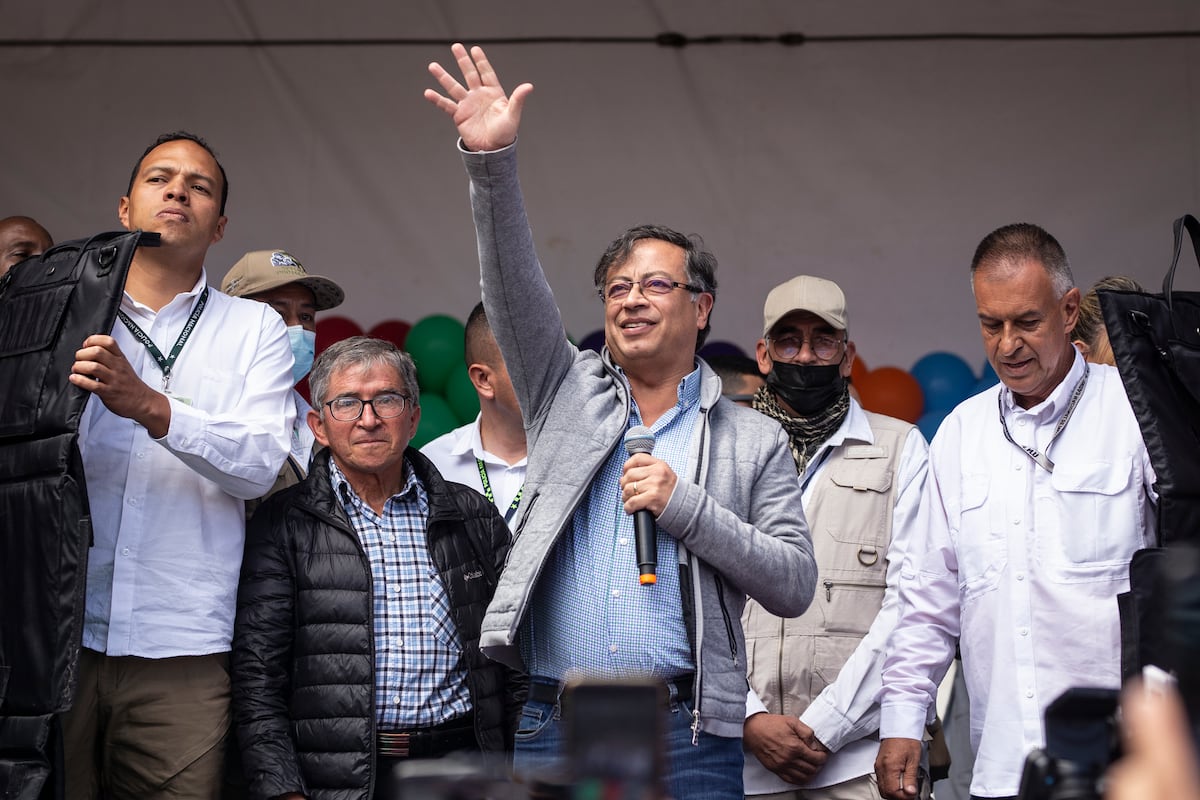The National Electoral Council has approved a formal investigation of Petro’s presidential campaign for violations of electoral limits

The Plenary Chamber of the National Electoral Council (CNE) has decided this Tuesday to open an investigation and file charges against the presidential campaign that brings Gustavo Petro to the Casa de Nariño in 2022, for violating the financing limits allowed by law. Among those mentioned in the presentation are President Petro himself, who was a candidate at the time; campaign manager and current president of Ecopetrol, Ricardo Roa; Treasurer, Lucy I. Mogollon; Auditors, Maria Lucy Soto and Juan Carlos Lemus; and Colombia Humana and Unión Patriótica (UP) parties. All were charged with “alleged violations of the financing arrangements for electoral campaigns.”
The presentation was promoted by Judge Álvaro Hernán Prada, a member of Uribe’s Democratic Center Party. The CNE is not a court but an administrative body, composed of politicians who act as magistrates. That is to say, many of its nine magistrates, like Prada, are former MPs. Not all are with the opposition, some are with the President, but the majority, 7 magistrates, voted in favor of Prada’s presentation. Only two, Alba Lucia Velasquez and Fabiola Marquez, saved their votes from the historic pact.
According to the CNE, the campaign for the first electoral round in the presidential election left out: a contribution made by the teachers’ union, known as FECODE, for 500 million pesos; Contributions made by the labor union, known as the USO, for 379 million pesos; a loan of 500 million pesos by the leftist party Polo Democratico Alternativeo; Report payments to election witnesses amounting to 921 million pesos; election campaign expenses amounting to 356 million pesos; Payment of 500 million pesos to the Colombia Humana Movement. The CNE decision also clarifies that legal entities such as FECOD and USO were prohibited from contributing to campaigns.
According to the CNE, there will again be irregularities for the second presidential round. Among these: the omission of a payment made by the campaign on June 19 to celebrate the victory at the Movistar Arena in Bogotá (which cost 100 million pesos); not reporting payments to election witnesses (177 million pesos); not reporting air transportation expenses (926 million pesos); not reporting expenses to Colombia Humana (530 million pesos); Not reporting contributions made by the USO (379 million pesos).
Overall, the irregularities of the two presidential visits would amount to 5,355 million pesos, which is a little more than one million dollars (about $1,269,000).
After hearing the news the President replied in reply, “The coup has begun.” Petro has said that, since Judge Prada’s presentation became known several months ago, this is an attempt to remove him. In addition, Prada is a politician who has been investigated in a lengthy scandal of witness tampering in which former President Álvaro Uribe, a classic foe of Patriarca, has been accused. In a speech in Antioquia, the President reiterated that the CNE’s decision is a blow to the 11 million Colombians who voted for him. He said, “They have put us in a difficult, serious moment, because what they are going to do is a coup, we are not stupid enough not to know it.” “There’s going to be a mobilization of people, and big, huge because these people are tired of injustice,” he said.
The CNE does not have the power to fire him, as the Council of State has clarified, and the maximum penalty it can impose is a fine. Only the legislature can remove the President if a formal charge is made before the Impeachment Commission, and subsequently approved in the House of Representatives to try the President in the Senate. A long road, but for President Petro this Tuesday’s CNE decision is a first step in that direction.
The coup has begun.
– Gustavo Petro (@petrogustavo) 8 October 2024
President Petro linked the CNE’s decision to the one it made a decade ago to fire then-lawyer Alejandro Ordóñez, accusing him of irregularities in public garbage collection policy. The dismissal in that case was demanded by Petro, and years later the Inter-American Court of Human Rights agreed with him: an administrative entity, such as the Attorney General’s Office, cannot dismiss a popularly elected citizen. The President believes that this decision of the IACHR has still not been respected by allowing the CNE to investigate him despite presidential immunity.
“I ask my lawyers to confront the IACHR ruling in my favor that it has been completely violated,” he said in X after his speech in Antioquia. He also requested the Foreign Ministry: “I ask for a full meeting of the diplomatic corps to explain to the world that what the CNE has done with the majority is a blow against the broad jurisdiction of the President and the popular vote and the law Is. , And finally, he called the Colombians again. “All the popular organizations of the country should come together in a permanent assembly. The time has come for the mass mobilization of the Colombian people,” he wrote.
All the popular organizations of the country should join in a permanent assembly. The time has come for a massive mobilization of the Colombian people.
Colombia’s constitutional president, elected by popular vote, ordered the public forces not to take up a single weapon…
– Gustavo Petro (@petrogustavo) 8 October 2024
(Tags to translate)Colombia(T)United States(T)Latin America(T)Gustavo Petro(T)CNE(T)Elections(T)Financing(T)Election financing